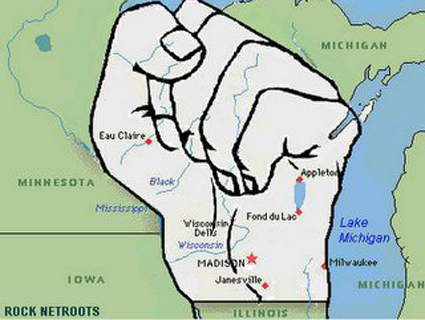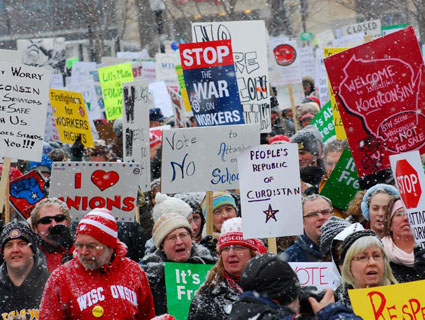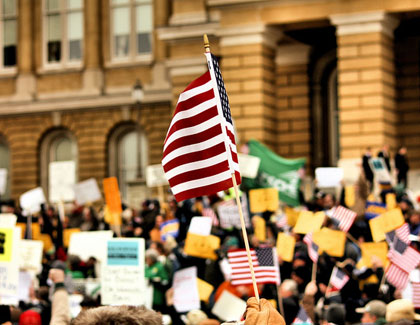
![]() This story first appeared on the TomDispatch website.
This story first appeared on the TomDispatch website.
It is easy to see the beginnings of things, and harder to see the ends.
—Joan Didion
In the February weeks I spent in snowy Madison, Wisconsin, that line of Didion’s, the opening of her 1967 essay “Goodbye to All That,” ricocheted through my mind as I tried to make sense of the massive protests unfolding around me. What was I witnessing? The beginning of a new movement in this country—or the end of an existing one, the last stand of organized labor? Or could it have been both?
None of us on the ground could really say. We were too close to the action, too absorbed by what was directly in front of us.
Of course, the battle between unions, progressive groups, and Wisconsin Republican Governor Scott Walker is not over. Not by a long shot. A county judge recently blocked “publication” of Walker’s anti-union legislation, saying it was possible Senate Republicans violated Wisconsin’s rigorous open records law when they rammed through a vote on his bill to do away with the collective bargaining rights of state workers. The case could end up before the state Supreme Court. But that didn’t stop the state’s Legislative Reference Bureau from publishing Walker’s bill anyway, touching off another round of arguing about the tactics used to make the bill into law. As of this writing, its actual status remains unclear. If a judge does force a new vote, it’s unlikely the outcome will change, though even that’s not certain.
Either way, the meaning of Madison, and also of what similar governors are doing amid similar turmoil in Columbus, Indianapolis, and other Midwestern cities, remains to be seen. Without the ability to bargain collectively, unions may indeed be fatally weakened. So, you could argue that the wave of attacks by conservative governors will gut public-sector unions in those states, if not wipe them out entirely.
On the other hand, those same efforts have mobilized startling numbers of ordinary citizens, young and old, educated and not, in a way none of us have seen since perhaps the 1930s. I know this for a fact. I was there in Madison and watched hundreds of thousands of protesters brave the numbing cold while jamming the streets to demand that Governor Walker back down. The events in Madison radicalized many young people who kept the flame of protest burning with their live-ins inside the Wisconsin State Capitol.
What remains to be seen is whether the new spark lit by the Republican Party’s latest crusade against unions can in some way fill the space left by those unions which, nationwide, stare down their own demise.
“Take the Unions Out at the Knees”
Madison was the beginning. When Scott Walker threatened to use the Wisconsin National Guard to quell a backlash in response to his draconian “budget repair bill,” it set off a month of protests. Almost as soon as Madison erupted, Ohio Republican Governor John Kasich, a former executive at Lehman Brothers, unveiled a union-crushing bill of his own, known as Senate Bill 5. Kasich sought even more power to curb unions than Walker, proposing to curb bargaining rights for all public-sector unions—Walker’s exempts firefighters and cops—and even outlaw strikes by public workers.
As in Madison, thousands of protesters poured into the Ohio Capitol in Columbus—that is, those who got inside before state troopers locked and blocked the doors. They brought megaphones and signs saying “Protect Workers’ Rights” and “Daughters of Teachers Against SB 5.” And in response, like Scott Walker, John Kasich has shown not the slightest willingness to negotiate; earlier this month, he promised to sign the bill into law as soon as the legislature approves it.
Meanwhile, the union-busting movement continues to spread. Iowa’s House of Representatives, controlled by Republicans, passed its own law in March gutting collective bargaining rights for public-sector unions. The measure, nearly identical to Wisconsin’s, would have made it to the desk of Republican Governor Terry Branstad, who backed the bill, and into law had the state’s Democrat-controlled Senate not killed it on the spot.
In early March, Idaho’s legislature voted to eliminate most bargaining rights for public school teachers, not to mention tossing out tenure and seniority. Two separate anti-union bills are wending their way through the Tennessee legislature—one in the state House that resembles Idaho’s, and another in the Senate that aims to outlaw collective bargaining for teachers altogether.
And now comes Alaska, one of the latest states to join the fight. There, on March 21st, a Republican state legislator introduced a measure nearly identical to Wisconsin’s that would strip most public-sector unions of the right to collectively bargain on health-care and retirement benefits. By one estimate, more than 20 state legislatures are considering bills to limit collective bargaining for unions.
Not to be forgotten is Indiana, where Democrats in the legislature’s lower chamber camped out beyond state lines for more than a month (as had Wisconsin Senate Democrats before them) to protest multiple pieces of legislation that would hurt unions and public-education funding. They returned to Indianapolis on Monday to cheers from supporters, their protest having killed a bill that would have made Indiana a “right to work” state while undermining support for other anti-union measures.
 Even if, in the end, its lawmakers don’t any pass anti-union legislation, Indiana is already illustrative of what happens when collective bargaining is wiped out. With a flick of his pen, Republican Governor Mitch Daniels banned it for state employees in 2005 by executive order. The result, as the New York Times reported, was significant savings for the state, but skyrocketing health insurance payments and a pay freeze for state workers. Management fired more experienced employees who would have had seniority under old union rules. And union membership among state workers dwindled by 90%, with one former labor activist claiming workers, fearing repercussions from their bosses, were afraid to pay union dues.
Even if, in the end, its lawmakers don’t any pass anti-union legislation, Indiana is already illustrative of what happens when collective bargaining is wiped out. With a flick of his pen, Republican Governor Mitch Daniels banned it for state employees in 2005 by executive order. The result, as the New York Times reported, was significant savings for the state, but skyrocketing health insurance payments and a pay freeze for state workers. Management fired more experienced employees who would have had seniority under old union rules. And union membership among state workers dwindled by 90%, with one former labor activist claiming workers, fearing repercussions from their bosses, were afraid to pay union dues.
Not that unions can’t exist in states without collective bargaining rights. In Arizona and Texas, for instance, unions still operate, even though both are heavily conservative “right-to-work” states, which means employees can opt out of union membership but still enjoy the wage increases and benefits negotiated by unions. Still, in those states, organized labor’s influence pales when compared to that of unions in Michigan or Wisconsin.
Then there are the political ramifications. Elected officials in each of these embattled states denied that any political motives lay behind their bills, but that’s obviously not true. Public-sector unions like the American Federation of State, County, and Municipal Employees are a pillar of support for the left wing of the Democratic Party. Knock out the unions, and you effectively “defund” that Party, as my colleague Kevin Drum put it recently.
Despite their pleas of ignorance, Republicans in Wisconsin, Iowa, Tennessee, Ohio, and every other state where legislation of this type is being considered understand perfectly well the damage their bills will inflict on their political opponents. As the top Republican in the Wisconsin Senate said, “If we win this battle, and the money is not there under the auspices of the unions, certainly what you’re going to find is President Obama is going to have a… much more difficult time getting elected and winning the state of Wisconsin.”
Indeed. So, in one sense, the intensifying assault on unions across much of the nation may represent an ending for a labor movement long on the wane and at least 30 years under siege by various Republican administrations, national and state. It is visibly now in danger of becoming a force of little significance in much of the country.
This is exactly what conservatives and the GOP want. As a director for the Koch brothers-backed advocacy group Americans for Prosperity recently admitted, “We fight these battles on taxes and regulation, but really what we would like to see is to take the unions out at the knees so they don’t have the resources to fight these battles.” If the bills mentioned here make it into law, the power wielded by public-sector unions—to fight for better wages and benefits, to demand a safer workplace, to elect progressive candidates—will wither. And with history as a guide, if union clout fades away, so, too, does the spirit of democracy in this country.
“If you look at the last 150 years of history across all nations with a working class of some sort, the maintenance of democracy and the maintenance of a union movement are joined at the hip,” Nelson Lichtenstein, a professor and labor historian at the University of California Santa Barbara, said recently. “If democracy has a future, then so, too, must trade unionism.”
The Radicalization of Tom Bird
If the events in Wisconsin and elsewhere do signal an end, they may also mark a beginning. I saw it in the outpouring of protesters in Madison, the young and old who defied convention and expectation by showing up day after day, weekend after weekend, signs in hand, in snow or sun, to voice their disgust with Scott Walker and his agenda. For me, the inspiration in that crowd came in the form of a tall, string-bean-thin 22-year-old with a sheepish smile named Tom Bird.
Bird’s radicalization, if you will, began innocently enough. As he told me one evening, when the news leaked out about the explosive contents of Walker’s bill, his reaction was typical: angry but resigned to the fact that, in a GOP-controlled legislature, it would pass. “What was I going to do about it?” was, he said, the way he then felt.
Bird was no labor activist. Far from it. A master’s student in nuclear engineering at the University of Wisconsin-Madison, he felt at home in the world of plasma physics. He’d opposed the Iraq war, but collective bargaining, walkouts, picket lines… well, not so much. He joined his first student-organized march from the university campus to the Capitol downtown in the days after Walker announced his bill more out of curiosity than indignation. He was, he told me, just tagging along with a friend.
Yet something kept pulling him back to the growing protests. He’d drop in on the demonstrators on his way to and from campus, wading through the throngs of people, admiring the signs taped to the walls of the Capitol rotunda, taking in the exhortations of the speakers at its center. The first night he spent in the Capitol, Bird testified in the all-night hearings taking place by reading a statement once given by Clarence Darrow, the famous civil liberties lawyer, in defense of a man named Thomas I. Kidd charged with treason for inciting workers to unionize in Bird’s hometown of Oshkosh. And in doing so, Bird felt something new: an urge to be part of a movement.
Day after day he gravitated closer to the drum circle and the speaker’s pulpit, the beating heart of those Capitol protests. And then, one day, someone handed him the megaphone. It was his turn to speak. He hadn’t necessarily planned this, so feeling the energy of the moment he simply stepped up and said what he thought. Before long, he was an activist whose impassioned cries rang out in the rotunda as loud as anyone’s. Any time I ventured into the Capitol I looked for Bird, with his Wisconsin baseball cap, lining up new speakers and keeping the drums beating. Someone even dubbed him “Speaker of the Rotunda.”
Bird and his newfound activist friends even organized the disparate groups inside the Capitol—the medic team, university teaching assistants, protest marshals, and more—into the Capitol City Leadership Committee. The CCLC, while short-lived, was created to ensure that the protests remained safe, peaceful, and forceful. It had its own leadership structure and governing bylaws. Once the police squeezed the protesters out of the Capitol for good, instead of dissolving and disappearing, the group evolved into the Autonomous Solidarity Organization, an outfit now determined to continue the fight for workers’ rights and social justice.
I’ve thought a lot of about Bird since then. If a 22-year-old plasma physics geek can be transformed into an activist in mere weeks, then maybe the crushing effects of Walker’s and Kasich’s bills and all the others can be channeled into new energy, into a new movement. It may not look like organized labor as we’ve known it, but it could begin to fill a void left in states where governors and legislatures are gutting the unions.
In Wisconsin, the upcoming weeks will put this new energy to a test. Right now, campaigns are underway to recall eight Republican state senators for their support of Walker’s “repair” bill; in the case of GOP Senator Randy Hopper, opponents have already collected enough signatures, including that of Hopper’s estranged wife, to demand a recall vote. And on April 5th, Wisconsinites will go to the polls to choose between a liberal candidate and a corporate-backed Republican for a seat on the state Supreme Court. That race is the first since the protests, and so could be the first true test of whether the crowds that stormed the Capitol can translate their anger into pressure at the polls.
No one can say for certain what Wisconsin, or Ohio, or Iowa will look like if organized labor is whacked at the knees. Will public-sector unions find a way to reinvent themselves, or will they slide into irrelevance like so many unions in the private sector?
As grim as the bills may be, I can’t help but feel hopeful, thinking about the massive protests I witnessed in Madison. I particularly remember one frigid night, when a group of protesters and reporters adjourned to a local bar for beers. At some point, Tom Bird bounded in, so full of energy, moving restlessly between our table and another with friends.
At one point, he rolled up his sleeve to reveal a scrawny bicep. Some of his fellow activists, he told me, wanted to get tattoos of one of the most enduring images from the protests, a solidarity fist in the shape of Wisconsin. “Except on mine,” he told us, “I want the Polish version: Solidarnosc.“
That, of course, was the labor movement that, after a decade-long struggle, helped bring down the Soviet Union. Who knows what could happen here if Bird and his compatriots, awakened by the spark that was Madison, were to keep at it for 10 years or more? Who knows if Wisconsin wasn’t the beginning of the end, but the beginning of something new?
















